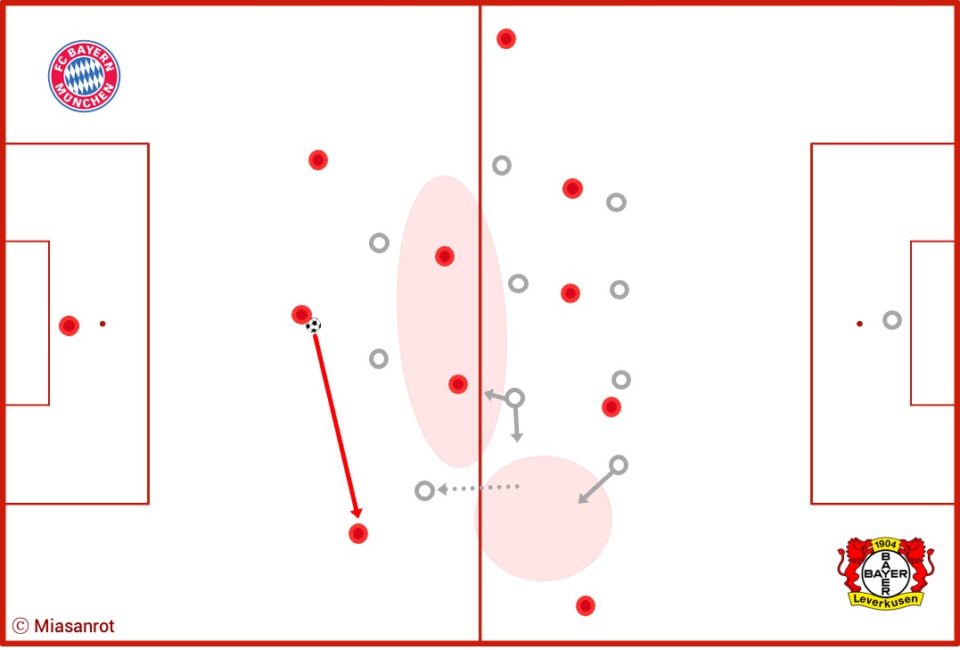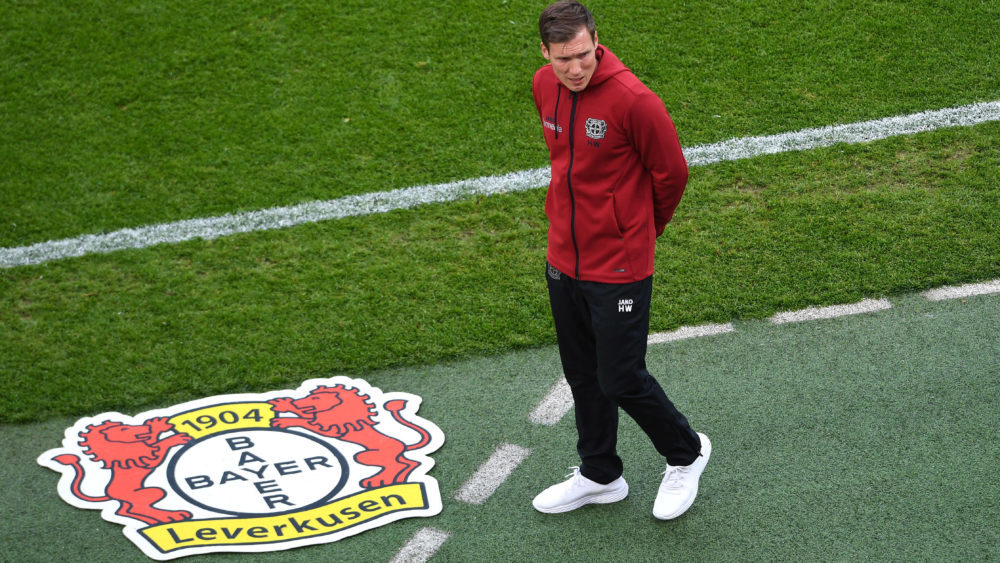Bundesliga MD 30 Preview: Bayern vs. Leverkusen
FC Bayern would have liked Hansi Flick to keep to the mutual agreement not to air the subject of his desired summer departure in public until after next weekend’s game against Mainz. Then, for the first time in a long time, the Bayern team will have two weeks in a row without mid-week action. No international matches, no stress, just training. Instead, last weekend in Wolfsburg, Flick apparently on a whim decided to say what everyone had expected to come to light for many days: he was asking the club for a release from his contract in the summer.
Is he therefore now in danger of becoming a lame duck in the last five games, threatening to make the championship exciting again? Probably not. The majority of the team is behind their coach, the joint successes have created a close bond between them. It is hard to imagine anything going wrong in the last few weeks.
On paper, Leverkusen and Gladbach are the last major potential stumbling blocks. But even if Bayern were to drop an unusual number of points, RB Leipzig would first have to beat opponents like Dortmund, Wolfsburg and Union. So for me to conjure up suspense here would probably take a major spell of illusionary magic.
Leverkusen’s turn away from possession?!
And yet, just out of sheer caution and professionalism, Bayern should not take their opponents lightly on Tuesday night. Since the change of coach from Peter Bosz to Hannes Wolf, the Werkself has picked up seven points from three games. However, to do so they only had to overcome against Schalke (18th), Cologne (17th) and Hoffenheim (12th).
Wolf has not changed much tactically, making only a few adjustments here and there. The most obvious change is that he does not place so much emphasis on controlling the opponent through possession as Bosz did. The sometimes long ball circulations without much territorial gain under Peter Bosz seem to be a thing of the past. With an average of 58.6% possession, Leverkusen is the team with the highest value in the Bundesliga. Yet under Wolf there seems to be a downward trend. Against Schalke (64.2%), possession was still very high. The next game against Hoffenheim, it was down to 54.4%, and it was further down to 42.9% against Cologne (!).
Wolf obviously more than Bosz relies on creating chances in offensive transition resulting from ball wins in pressing and gegenpressing situations. Unlike Bosz, however, Wolf apparently does not set up his team so as to try to force the opponent into mistakes through constant pressure. From a now deeper 4-4-2 formation, it seems to be the coach’s intention to stabilize the defense and to play forward quickly when the ball is won. This at least is what has transpired after his first three games.
Leverkusen’s pressing is not flawless
A recurring pattern in Leverkusen’s setup out of possession is the different width of the defense and midfield lines. In defense, Leverkusen so far have been laterally very tight, while in midfield the four players are positioned somewhat wider. Presumably, this is to provide a more even horizontal coverage in defending. In front, there are usually two strikers, but as soon as the opponent builds up out to the wings, the wide midfielder close to the ball moves forward, thus creating an asymmetrical 4-3-3.
Leverkusen want to put pressure on the opponent’s player in possession, while at the same time also trying to avoid offering too many open spaces at the back in case the opponent does break through their pressing. Too often, however, the Werkself seems to be caught between two stools in the search for the right compromise. Schalke and Cologne, the two teams from the bottom of the table, did not manage to provoke these moments sufficiently. Hoffenheim were more capable of doing so.

So far, Wolf’s pressing has two crucial weaknesses: Due to the unfavourable positioning of the strikers, who have to close down their opponents from a position of equal height on the pitch, the opposing player in possession is offered unobstructed passing lanes between Leverkusen’s lines. At the same time, Leverkusen’s midfielders too seldom manage to consistently push up behind them. As soon as the ball is played into the space between attack and midfield, you can see the conflict: either push out aggressively, or provide protection at the back. With Joshua Kimmich and the returning Leon Goretzka – albeit possibly from the bench – Bayern will have a home advantage in a double sense if Leverkusen fail to address these issues. Wolf is unlikely to succeed at Bayern with half-baked pressing.
The second aspect is the wide defense. In the three games under Wolf, Leverkusen have not managed to keep the vertical gaps small enough, both on the near and far side of the ball. It often takes a little too long for the full-back to push up to fill the gap left by the midfield player in front of him when he pushes up as well, and for the three remaining midfielders to close the gap so created. Here, too, Bayern are well equipped with Thomas Müller and ther wingers to capitalize on this.
Bayern must resist a loss of focus
Leverkusen are reasonably far removed from the form they had in the reverse fixture earlier this season. Nevertheless, there is no question that on good days they are a top team in Germany. Not only their pace in attack, but also the technical quality of their main players is on a very high level. But they have rarely been able to show it in recent months. Even under Wolf, their play looks rather pedestrian at times.
There is still a lack of creativity with the ball, individual players take too long in possession, which makes it comparatively easy for opponents to put them under pressure. The center of midfield in particular is not always switched on enough in build-up play. For example, Leverkusen too often lack passing options in the center after playing out to the wide players in build-up. One possible approach for Bayern on Tuesday evening is to press them particularly aggressively there.
However, the Bayern team must be careful not to be caught off guard with long balls. Against Hoffenheim, Leverkusen time and again managed to relieve the pressure with long balls over the top and thus either conjure up an immediate goal threat or create good gegenpressing situations.
Putting everything on a plate for Lewa?
In a sense, Bayern will be their own worst enemy in the coming weeks maintaining the focus until the championship is ultimately secured. But they are familiar with this situation from many years before. Besides, there is another big goal besides the ninth championship in a row: Robert Lewandowski’s attack on Gerd Müller’s legendary 40 goal in a season record.
It is conceivable that breaking this record will not only provide extra motivation for the world footballer, who may return next weekend against Mainz, but also his teammates. From the moment when Bayern have sealed up a game or even the overall championship, it could happen that the team focuses its game even more on Lewandowski.
The Pole will still be out against Leverkusen. Should he be able to play again in Mainz, he will have four games to score five goals. Then he would be on a par with Müller. If he managed six goals, he would be the sole record holder. There are many unknowns in this story: How fit will he be upon his return? How much has his form suffered? He might already have broken the record if the injury had not stopped him. But that remains idle speculation. Nothing is settled yet. For the time being, however, Bayern’s goal is to beat Leverkusen at home and thus bring something tangible in these uncertain times: three points in the title race.









